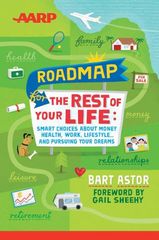| The other day a friend was thumbing through my book, AARP Roadmap for the Rest of Your Life, and chanced to stop at the section on hobbies. He commented, “I suppose you are recommending we start a hobby so that later when we cut back on work or retire completely, we won’t be sitting around watching TV all day.” I said, “No, I’m not suggesting anything of the sort. I’m suggesting that if, when you cut back or retire you decide to sit around and watch TV, it’ll be your choice and will be what fills your leisure time. It will be your hobby.” “But that’s bad,” he said. “Huh?” I responded. “Why is it bad? If it’s what you want to do, if it’s what gives you pleasure, then that’s what you’ll do. You don’t need to put a value judgment on what you like.” Well, you can imagine that that went over like a ton of bricks. He believes it’s bad to sit around and be unproductive. So watching TV for hours on end is not an acceptable use of his time. Ironically he has no problem sitting around for hours watching a baseball game on TV. Or streaming movies. I guess those are productive ways to pass your time. Personally I don’t see any difference from reading mysteries or so-called “beach reads.” Am I being any more “productive” when I’m reading a Stephen King novel than I am watching a movie on TV based on a Stephen King novel? Yet to him it’s “bad” to watch TV for extended periods of time. I don’t mean to be criticizing him or singling him out. I think it’s what so many of us say. We decide that something is bad or good. That directs our lives and, unfortunately, narrows our thinking. I have a totally different philosophy than my friend. I won’t foist my view of life onto him. But I will invite him to cut back on the value judgments. All it will do will be to limit his life. And, likely, make him less happy. There are a few other reasons I don’t encourage labeling an activity as good or bad. In addition to limiting his behavior, he’s also effectively putting down people who do, in fact enjoy sitting around watching TV. Or who do so because they have physical limitations and it’s an activity they can do. So by deciding that what I’m doing is bad, he’s made both of us unhappy. Another reason to hold off on labeling yourself is that it defines who you are, as if that’s a permanent scarlet letter. It’s neither a scarlet letter nor permanent. It’s now, it’s what you enjoy now. When you no longer enjoy what you’re doing you’ll very likely change your behavior. I realize this sounds so “Zen-like.” But really, it’s just basic common sense. So I have two pieces of advice about choosing hobbies or leisure time activities: 1. Accept that what it is you do in your spare time is what you like to do. 2. Don’t judge what you choose. | Life Story Joanna, whom I highlight in my book, retired from being a middle school principal. When she was working she would come back after a hard day and, most evenings, sit around watching TV before going to bed early. Joanna’s children and friends worried that when she retired that’s all she would do, that is, sit around doing crossword puzzles and watching TV all day, “wasting away,” as they’d call it. She didn’t appear to have any “hobbies” they could see. But of course, she did have a recreational activity she loved: crossword puzzles and TV shows. For a while, Joanna didn’t do too much more than what her kids envisioned. She began each new day by blissfully getting up late and reading the newspaper (always getting the crossword puzzle done first). Her days weren’t very filled, but she did manage to catch up on a few things and be in touch with a few friends. But for the most part, she really did watch a lot of TV, mostly cooking shows, the history channel, and animal planet. After the official retirement at the end of the school year, she rented a beach house for a week where her children and grandchildren joined her. When the school year began, she relished that she did not have to go to school and she continued her daily routines. Fast forward six months and you would not recognize her or her lifestyle. During those months she began tutoring ESL to a couple of children, tried being a docent at a local museum (which she didn’t enjoy and eventually stopped), and volunteers as a Traveler’s Aide worker in the airport, helping passengers navigate around the airport and answering their questions about the area. She still watches a lot of TV, not wanting to miss her special shows, and remains addicted to her crossword puzzles. But her life is full and, in her own words, she is “happier than I’ve ever been.” No value judgments about “wasting her time” and no regrets about how she spends her days being unproductive. She doesn’t know what’s next, but she’s not worried about her future. |

 RSS Feed
RSS Feed
